Kenya failings drive al-Shabab recruitment
- Published
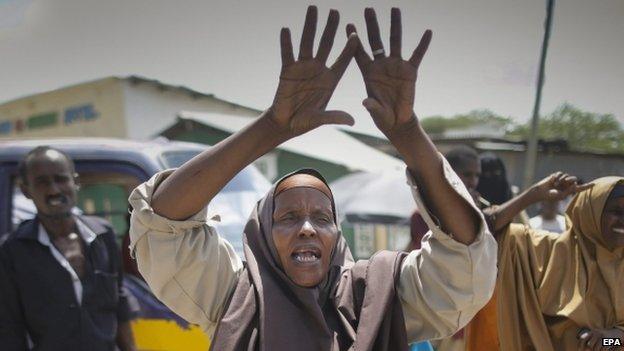
Anti-al-Shabab feeling is running high in Kenya
There is no doubt that Kenya has been deeply scarred by the attack on the University in Garissa, in which at least 148 people were killed.
One senior police officer was reduced to tears in his office as he recalled in an off-the-cuff chat, the cold-blooded way the gunmen picked through their victims' belongings, forced them onto the floor face down, then gunned them down.
Kenyans are hard-working people who deeply care about security but many express a sense of being hamstrung.
As one man I spoke to in Garissa put it, there is "a sense of disconnect between the government and its people" and its ability to provide security in the face of an al-Shabab threat.
Key to this is a deep mistrust of authority.
Kenyan whistle-blower John Githongo, who in secretly recorded tapes exposed corruption under a previous administration, has been talking on social networks of "chickens coming home to roost".
He is not alone in that view.
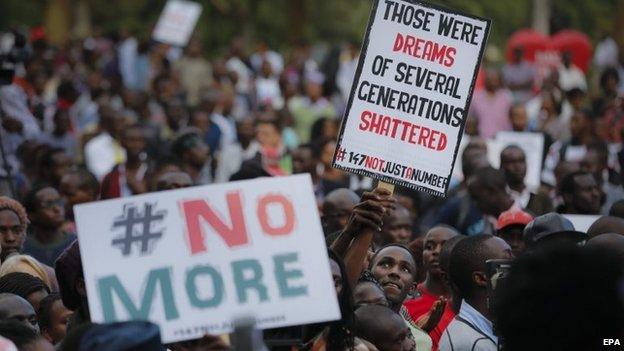
This was the most deadly attack in Kenya since 1998
Porous borders, allegations of widespread corruption within the security services and even claims by the Muslim community of "extrajudicial killings" all sound remarkably familiar to Kenyan ears.
It was no surprise then that many rolled their eyes in dismay, rather than marched in anger on the streets, at reports that the plane that was meant to bring commandos to storm the building during the deadly siege in Garissa, was delayed by several hours.
It had apparently been diverted, sent to collect a police chief's family, from their holiday on the coast. The police are yet to comment on the allegation.
Tactical shift
Intelligence reports and parliamentary committees have warned of a tactical shift in the Somali Islamist group's recruitment campaign.
The evidence that al-Shabab is hiring in the "Kenyan homeland" shows it is exploiting the country's Achilles heel - what people here call "graft".
A thoughtful Kenyan businessman of Somali origin I met in the arid north-east of the country told me bluntly that for a government to win the fight against terrorism, it needed to win its people's trust first.
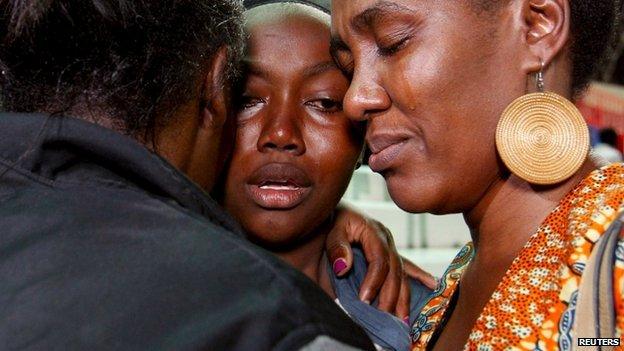
The Garissa attack stirred strong emotions
The scramble to woo the Muslim community in the past few days in these remote dusty parts, by a posse of government envoys, appears to be a frank admission that it needs to make friends.
Ali (this same Kenyan businessman whose name I have changed because like many others he fears his candour will lose him his job) told me he had spent a lot of time in the US and the Middle East since the 9/11 attack and had devoted much time to pondering about security.
Building elaborate "fences" to seal the border with Somalia, a programme which got under way this week, sounds to many like Ali more like a money-making scam than a concerted effort to control cross border attacks by al-Shabab.
What is needed, he believes, is not walls and fences but robust "intelligence gathering" and covert operations, which cannot be sabotaged by "graft".
Missed opportunities
As President Uhuru Kenyatta talks tough in the fight against corruption, one is left with a sense of missed opportunities to win the confidence of some in the Muslim community here.
In 2007 I stood on the border between Somalia and Kenya, as the US and Kenyan military bombed camps in Somalia used by fighters from the Islamic Courts - the precursor to al-Shabab.
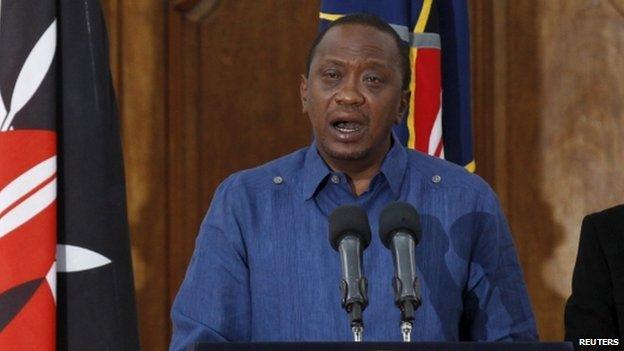
President Kenyatta has pledged to tackle corruption
Scores of Somali Kenyans caught up in the bombing flooded back across the border and headed home.
Many were picked up along the way by FBI agents and their Kenyan police colleagues, bundled onto unmarked planes and sent secretly to Ethiopia.
It was part of a programme of renditions, which would do little to win the confidence of the Kenyan Muslim community.
I met some of the families of the men once they had been released.
Their anger was not that their sons had been picked up, but that due legal process had not been followed.
Since then, what some consider the unfair racial profiling of ethnic Somalis who are Kenyan citizens by the police, has left men like Ali feeling that they are "bearing the cross" for the actions of Islamist militants like al-Shabab.
In the wake of the Westlands shopping complex attack nearly two years ago, nearly 1,000 Somali Kenyans were rounded up and held in a vast football stadium in the capital.
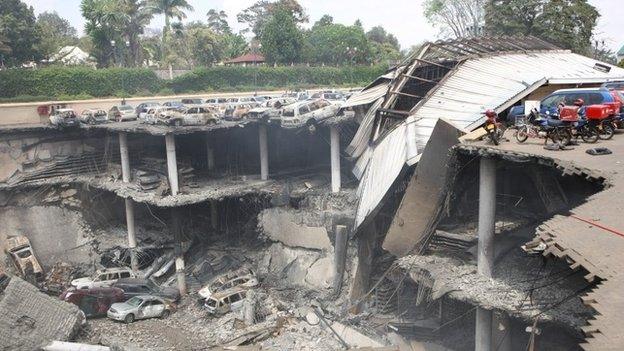
Damage at the Westgate shopping centre in 2013
The press dubbed it the Kassarani "concentration camp", external after the name of the stadium and it is far from clear whether the detainees, many of them successful Kenyan businessmen, were able to shed much light on fears of a home-grown al-Shabab recruitment campaign.
If anything, such treatment, community leaders argued, would serve to help radicalise some men angry at their treatment and at worst, push them into the arms of al-Shabab instead.
The recruitment of Kenyans on the "homeland" is now a cold and uncomfortable reality facing the intelligence services.
But if, as Ali claims, you "pay a few shillings and you can be sold out or set free" by the security services, then stemming the tide of recruitment, is going to be hard.
- Published16 April 2015

- Published10 April 2015
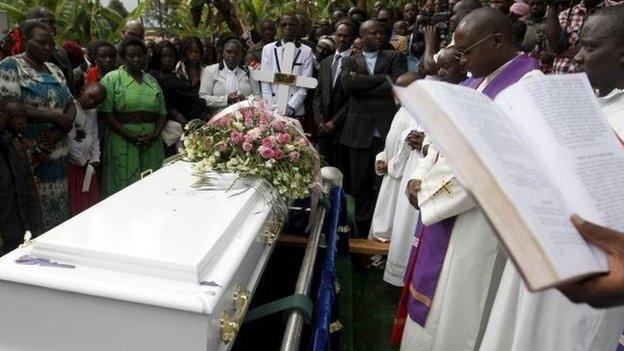
- Published16 April 2015

- Published24 September 2013
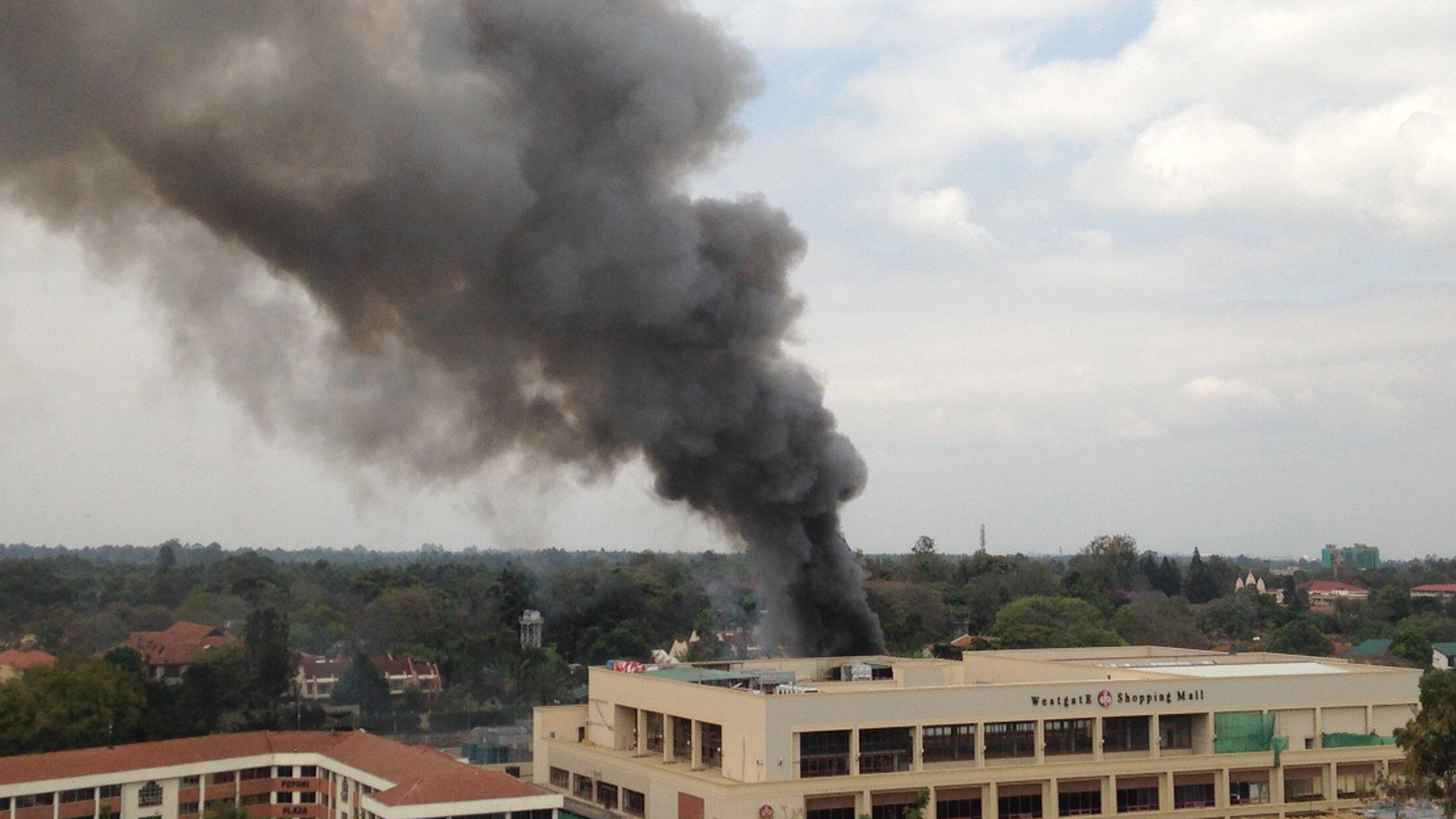
- Published4 April 2015
